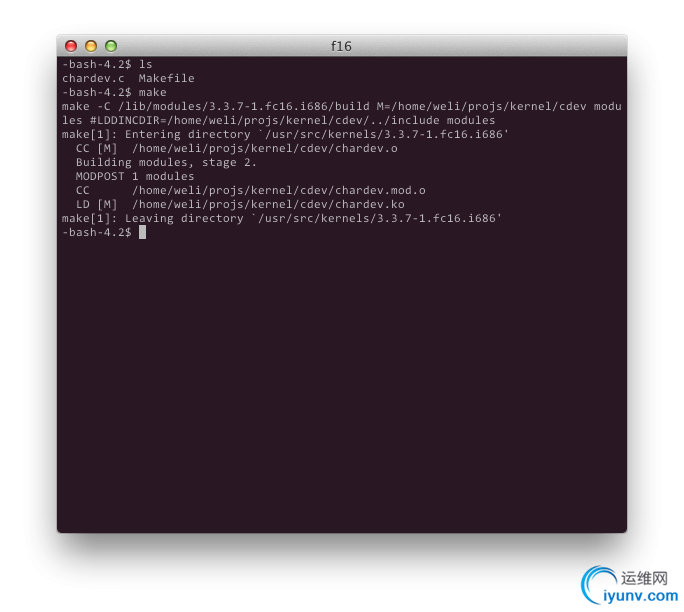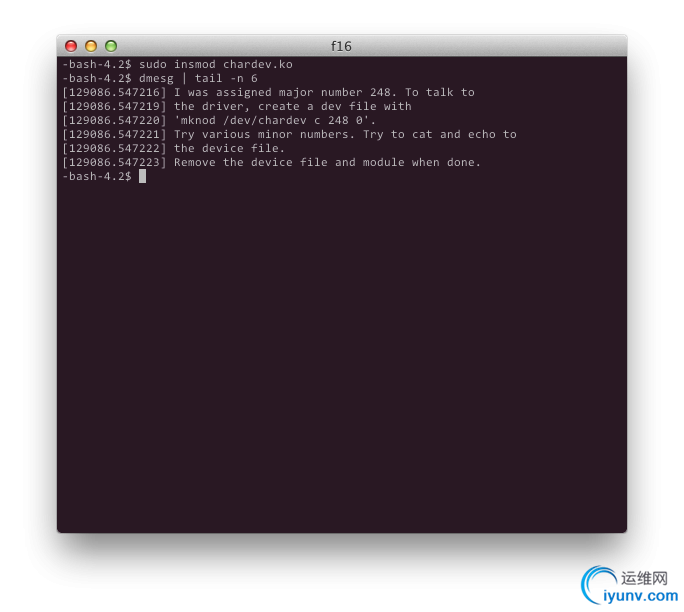|
|
本文制作一个char设备。撰写chardev.c如下:
/*
* http://linux.die.net/lkmpg/x569.html
*/
/*
* chardev.c: Creates a read-only char device that says how many times
* you've read from the dev file
*/
#include <linux/kernel.h>
#include <linux/module.h>
#include <linux/fs.h>
#include <asm/uaccess.h> /* for put_user */
/*
* Prototypes - this would normally go in a .h file
*/
int init_module(void);
void cleanup_module(void);
static int device_open(struct inode *, struct file *);
static int device_release(struct inode *, struct file *);
static ssize_t device_read(struct file *, char *, size_t, loff_t *);
static ssize_t device_write(struct file *, const char *, size_t, loff_t *);
#define SUCCESS 0
#define DEVICE_NAME "chardev" /* Dev name as it appears in /proc/devices */
#define BUF_LEN 80 /* Max length of the message from the device */
/*
* Global variables are declared as static, so are global within the file.
*/
static int Major; /* Major number assigned to our device driver */
static int Device_Open = 0; /* Is device open?
* Used to prevent multiple access to device */
static char msg[BUF_LEN]; /* The msg the device will give when asked */
static char *msg_Ptr;
static struct file_operations fops = {
.read = device_read,
.write = device_write,
.open = device_open,
.release = device_release
};
/*
* This function is called when the module is loaded
*/
int init_module(void)
{
Major = register_chrdev(0, DEVICE_NAME, &fops);
if (Major < 0) {
printk(KERN_ALERT "Registering char device failed with %d\n", Major);
return Major;
}
printk(KERN_INFO "I was assigned major number %d. To talk to\n", Major);
printk(KERN_INFO "the driver, create a dev file with\n");
printk(KERN_INFO "'mknod /dev/%s c %d 0'.\n", DEVICE_NAME, Major);
printk(KERN_INFO "Try various minor numbers. Try to cat and echo to\n");
printk(KERN_INFO "the device file.\n");
printk(KERN_INFO "Remove the device file and module when done.\n");
return SUCCESS;
}
/*
* This function is called when the module is unloaded
*/
void cleanup_module(void)
{
/*
* Unregister the device
*/
unregister_chrdev(Major, DEVICE_NAME);
}
/*
* Methods
*/
/*
* Called when a process tries to open the device file, like
* "cat /dev/mycharfile"
*/
static int device_open(struct inode *inode, struct file *file)
{
static int counter = 0;
if (Device_Open)
return -EBUSY;
Device_Open++;
sprintf(msg, "I already told you %d times Hello world!\n", counter++);
msg_Ptr = msg;
try_module_get(THIS_MODULE);
return SUCCESS;
}
/*
* Called when a process closes the device file.
*/
static int device_release(struct inode *inode, struct file *file)
{
Device_Open--; /* We're now ready for our next caller */
/*
* Decrement the usage count, or else once you opened the file, you'll
* never get get rid of the module.
*/
module_put(THIS_MODULE);
return 0;
}
/*
* Called when a process, which already opened the dev file, attempts to
* read from it.
*/
static ssize_t device_read(struct file *filp, /* see include/linux/fs.h */
char *buffer, /* buffer to fill with data */
size_t length, /* length of the buffer */
loff_t * offset)
{
/*
* Number of bytes actually written to the buffer
*/
int bytes_read = 0;
/*
* If we're at the end of the message,
* return 0 signifying end of file
*/
if (*msg_Ptr == 0)
return 0;
/*
* Actually put the data into the buffer
*/
while (length && *msg_Ptr) {
/*
* The buffer is in the user data segment, not the kernel
* segment so "*" assignment won't work. We have to use
* put_user which copies data from the kernel data segment to
* the user data segment.
*/
put_user(*(msg_Ptr++), buffer++);
length--;
bytes_read++;
}
/*
* Most read functions return the number of bytes put into the buffer
*/
return bytes_read;
}
/*
* Called when a process writes to dev file: echo "hi" > /dev/hello
*/
static ssize_t
device_write(struct file *filp, const char *buff, size_t len, loff_t * off)
{
printk(KERN_ALERT "Sorry, this operation isn't supported.\n");
return -EINVAL;
}
然后撰写Makefile:
# Comment/uncomment the following line to disable/enable debugging
#DEBUG = y
# Add your debugging flag (or not) to CFLAGS
ifeq ($(DEBUG),y)
DEBFLAGS = -O -g # "-O" is needed to expand inlines
else
DEBFLAGS = -O2
endif
EXTRA_CFLAGS += $(DEBFLAGS) #-I$(LDDINCDIR)
ifneq ($(KERNELRELEASE),)
# call from kernel build system
obj-m := chardev.o
else
KERNELDIR ?= /lib/modules/$(shell uname -r)/build
PWD := $(shell pwd)
default:
$(MAKE) -C $(KERNELDIR) M=$(PWD) modules #LDDINCDIR=$(PWD)/../include modules
endif
clean:
rm -rf *.o *~ core .depend .*.cmd *.ko *.mod.c .tmp_versions
depend .depend dep:
$(CC) $(CFLAGS) -M *.c > .depend
ifeq (.depend,$(wildcard .depend))
include .depend
endif
接下来是生成目标文件:

然后是安装驱动,并查看内核的日志输出:

看到驱动已经成功加载了,此时查看设备列表:

可以看到最后一行,设备已经加载了。此时使用mknod在dev中安装这个chardev设备:

此时已经可以使用这个设备了:

测试完成后,删除设备并卸载驱动:

|
|